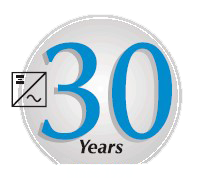Just because you know about industrial power inverters doesn’t mean you can buy any unit you come across. You should do some research, and preferably ask the inverter manufacturers a few questions before buying one.
1. How do I benefit buying directly from the manufacturer?
You have not one, but three benefits. The first is that you get quicker and better technical assistance if there are inverter problems.
Second, the manufacturer won’t replace parts with cheap or unreliable parts. They usually have original spare parts ready for your inverter. Third, buying directly from the manufacturer means you buy it from someone who knows the inverter inside and out.
2. What are your product certifications?
Inverter manufacturers generally provide varied certifications based on the device’s final application. For example, inverters that will be used in places with airborne contaminants, heavy vibrations and moisture, and other unusual operating conditions, need a NEBS Level 3 certification. Other possible certifications they may provide for industrial inverters are TUV-TL9000 or RoHS certifications.
3. What technology do you use in your inverter manufacturing process?
Different inverter manufacturers use different technologies in their manufacturing process. For example, Exeltech uses surface mount technology and a Pick and place system where all models are built using standardized parts.
It minimizes setup time and at the same time eliminates the chance of errors occurring while reloading and setting up machines. Some processes are also manually performed, like adding large capacitors to minimize automation error.
Exeltech inverters do not have any hand soldering because of their unique vapor phase reflow process. Thanks to their PCBs they don’t need any Point to Point wiring for interconnectivity.
Asking inverter manufacturers these 3 questions makes the process of buying industrial power inverters all the more easier. You know you are buying trusted products from manufacturers like Exeltech who know what they put into their industrial power inverters.




